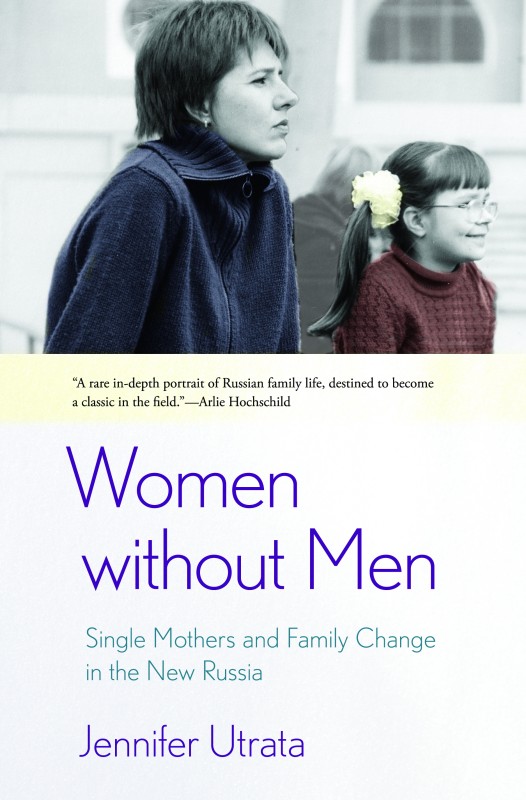Single Mothers and Family Change in the New Russia: “Destined to become a classic in the field.”
TACOMA, Wash. – In modern Russia, single motherhood is all too often a better choice than married life. This is accepted as a fact, not only by many single mothers and by Russian society as a whole—but even by many of the fathers who are shown the door.
How did it come to be that Russian family life, once tightly bound by a paternalistic, socialist system, changed so dramatically over the past three decades to one with many single-mother families? As rueful Russians are apt to say, is it caused by “weak men” and a “weak state”?
The answers to these questions, and the firsthand stories of ordinary Russians who have coped with the changes, are examined in the new book Women without Men: Single Mothers and Family Change in the New Russia (Cornell University Press, April 2015), by Jennifer Utrata, associate professor of sociology and anthropology at University of Puget Sound.
Women without Men draws on more than 150 interviews, intensive fieldwork, and extensive ethnographic data to put together the puzzle of how single motherhood—frequently seen as a social problem in other countries—became taken for granted in the new Russia.
While most Russians still believe that two-parent families are preferable, many also contend that single motherhood is an inevitable byproduct of two intractable problems. The first is the large number of men who failed to cope with the demands and temptations of a more capitalistic economy or who found solace in a vodka bottle. The other is a new state that dropped its pervasive socialist safety net, leaving a highly unequal economy and poor social services.
The surprise element in the relative “success” of single motherhood in Russia—where women find strength, and even joy, in raising their children without the handicap of a jobless or alcoholic father—is the character who steps up to make it work, typically a grandmother, but occasionally a sister or aunt. So it is that many children are being raised by two parents, both women, in a society that remains dominated by men.
Utrata’s book tells stories of transitions, hardships, and triumphs through the eyes of many of the players: the single mothers, married mothers, grandmothers, and nonresident fathers. She also draws comparisons with parallel experiences and data in the United States, allowing readers to view single motherhood on two very different continents.
In the United States, Utrata writes, single motherhood has risen sharply since the 1960s, and at least half of U.S. children will spend part of their childhood in a single-parent family. “Single-mother families continue to serve as convenient scapegoats for problems ranging from family breakdown to high prison rates, gun violence, and even the alleged ‘decline of men,’” she writes.
In Russia, divorce rates have long been high. Even so, nonmarital births have climbed steadily since the collapse of the Soviet Union in 1991, and today account for nearly one in three births.
Yet Utrata observes that “few consider single motherhood any great tragedy.” Some single mothers argue that it is the married women who bear heavier burdens. Even Russian men “agree that most men are ‘by nature’ irresponsible and less capable of adaptation than women,” she writes.
Women without Men takes the reader through the history that brought Russian families to where they are today; it presents evidence of their current state. It arrives at fascinating conclusions that compare the United States’ post-industrial family with that of the new Russia.
The book notes that while Russian families are splitting and then re-forming along matrifocal lines, Americans, too, are feeling more and more insecure as jobs, relationships, and social supports become more precarious. As this breakdown happens, U.S. middle-class families are more frequently turning to extended families for support, in a trend that is expected to grow.
Meanwhile, capitalist influences in Russia have changed what it means to be a single mother. Though many mothers are disillusioned with men and the state, they often embrace many aspects of capitalism. Utrata says because single mothers feel that they must “go it alone,” the new ideology of independence and self-reliant success ushered in by Russian capitalism “resonates with single mothers’ experience and provides them with dignity.”
In a review of Women without Men, Arlie Russell Hochschild, professor emerita of sociology at University of California, Berkeley, and author of books including The Second Shift, The Managed Heart, and The Outsourced Self, writes, “Utrata offers a rare in-depth portrait of Russian family life, destined to become a classic in the field.”
For the publisher’s page on Women without Men, visit: http://www.cornellpress.cornell.edu/book/?GCOI=80140100573890
Press photos of Jennifer Utrata and Women without Men can be downloaded from pugetsound.edu/pressphotos.
Tweet this: Women without Men, a new book by Jennifer Utrata @univpugetsound @cornellpress on #singlemothers, family in #Russia #sociology http://bit.ly/1zksSbg
Follow us on Twitter! twitter.com/univpugetsound

